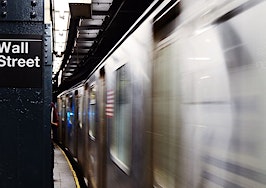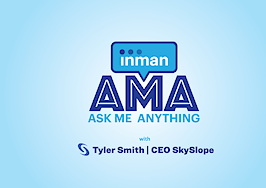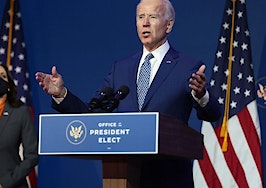Pharmaceutical giant Pfizer announced last week that the company is one step closer to having a widely-available COVID-19 vaccine. In a study of more than 45,000 individuals, the vaccine candidate was found to be more than 90 percent effective in preventing COVID-19, the company announced.
While the actual timing of the vaccine’s availability depends on myriad different logistics, the news gives some hope for a future not dominated by COVID-19, especially at a time when numbers are spiking and states and cities are re-instituting some lockdown measures.
A safe, effective and widely accessible vaccine would obviously be world-altering news on a humanitarian scale, but the trickle-down effect would also have an impact on the housing market. Inman spoke with a number of economists and real estate agents about how much it could impact the housing market overall.
Impact on home affordability?
The news of an effective vaccine — which in turn means a potential light at the end of the COVID-19 tunnel — would obviously be good news for the economy overall. The early week spike in the equity markets as a result of the Pfizer news provided clear evidence for that hypothesis.
An effective vaccine, according to Redfin Chief Economist Daryl Fairweather, would mean more employees would return to work sooner and consumers could spend money in “ways that would have been too risky during the pandemic.”
“A strong economy is generally good news for the housing market as people are more likely to buy homes when they feel good about their economic prospects,” Fairweather told Inman.
There’s one caveat, however. A strong economy also likely means interest rates may start to rise, according to Fairweather. Mortgage rates have spent the pandemic setting almost weekly record lows.
Realtor.com Chief Economist Danielle Hale echoed that same sentiment.
“News of an approved vaccine is likely to lead to higher mortgage rates which could dampen buyer demand somewhat as affordability becomes more of a challenge,” Hale told Inman. “But I don’t expect a huge pullback in buyer demand which has been quite strong.”
How will it impact migration trends?
Rich Barton, the CEO and co-founder of Zillow, believes this “great re-shuffling,” in his words, is here to stay — even after the pandemic ends. On his company’s third-quarter earnings call, Barton was clear that, “simply put, people want to move.”
Much was discussed about the suburban boom that fueled the hot housing market, but many of the underlying trends could be here to stay, Fairweather agreed.
“Some of the pandemic-driven housing trends with people seeking out larger homes in less dense areas could slow down, although I believe many of these trends are here to stay,” Fairweather said. “Work from home is now socially acceptable and that will be a boon to the housing market as more people are able to move to places where they can afford homes.”
Those work-from-home trends will be the key component in dictating what the future looks like, in terms of where people want to live, and what they’re looking for in a home, Hale said.
“Working from home has been relatively successful for many during this pandemic, and our surveys show that workers prefer to work from home at least occasionally even though the vast majority expect employers to require at least part-time in-office work in the future,” Hale said.
“If we see more remote work even after a vaccine, that could help sustain the recent preference we’ve seen for the suburbs, as homebuyers may be willing to accept a longer commute if they’re only doing it three or four days a week as opposed to five.”
For agents based in cities, the news of a continued suburban escape might seem gloomy, but Fairweather believes if some employees return to the office, the housing markets of expensive cities like San Francisco and New York may recover.
Michael J. Franco, a New York City-based Compass agent, believes a vaccine is going to be a huge boost for migration back to New York City.
“Many people currently out of the city want to come back as soon as possible,” Franco told Inman. “It will also mean more people returning to their offices, which will make the short commute (if residing in the city) once again appealing to those who abandoned their leases.”
“They will come back and rent something new,” Franco added. “Gradually, everything is going to open back up, including restaurants, culture, etc. I think it’s going to be phenomenal.”
Although President Donald Trump said Friday he wouldn’t immediately send the vaccine to New York after Gov. Andrew Cuomo expressed skepticism over the administration’s ability to deliver a safe cure, time remains for those logistical details to be ironed out. There’s also a chance Trump won’t be in office when the vaccine begins to be widely distributed.
Will agents return to open houses and in-person showings?
The pandemic has not only changed where people want to live, but how they buy and rent homes. Leaders in the field have been clear that many of the trends — like 3D tours and digital closings — are here to stay, but will some of the old ways return once a vaccine is approved and made readily available?
Franco believes that it will take a while for open houses and showings to resume as normal, simply because the rollout of the vaccine will not happen overnight.
“Some buildings are going to continue restricting showings and public access at least to some extent,” Franco said. “Things are not going to go back to the way they were at least immediately (if ever).”
“At a minimum, there is going to continue to be some restrictions in certain buildings because of concerns of shareholders,” Franco added. “It will happen gradually.”
Bill Kowalczuk, an agent with Warburg Realty, believes it will take a while for open houses to once again become the norm.
“Some sellers would be more comfortable with it than others,” Kowalczuk said. “At the very least, we would have to limit the number of people that are allowed inside at one time.”













